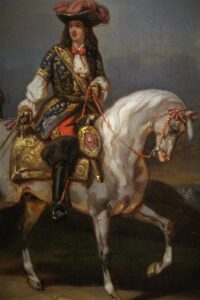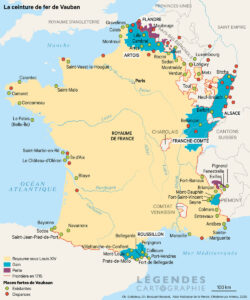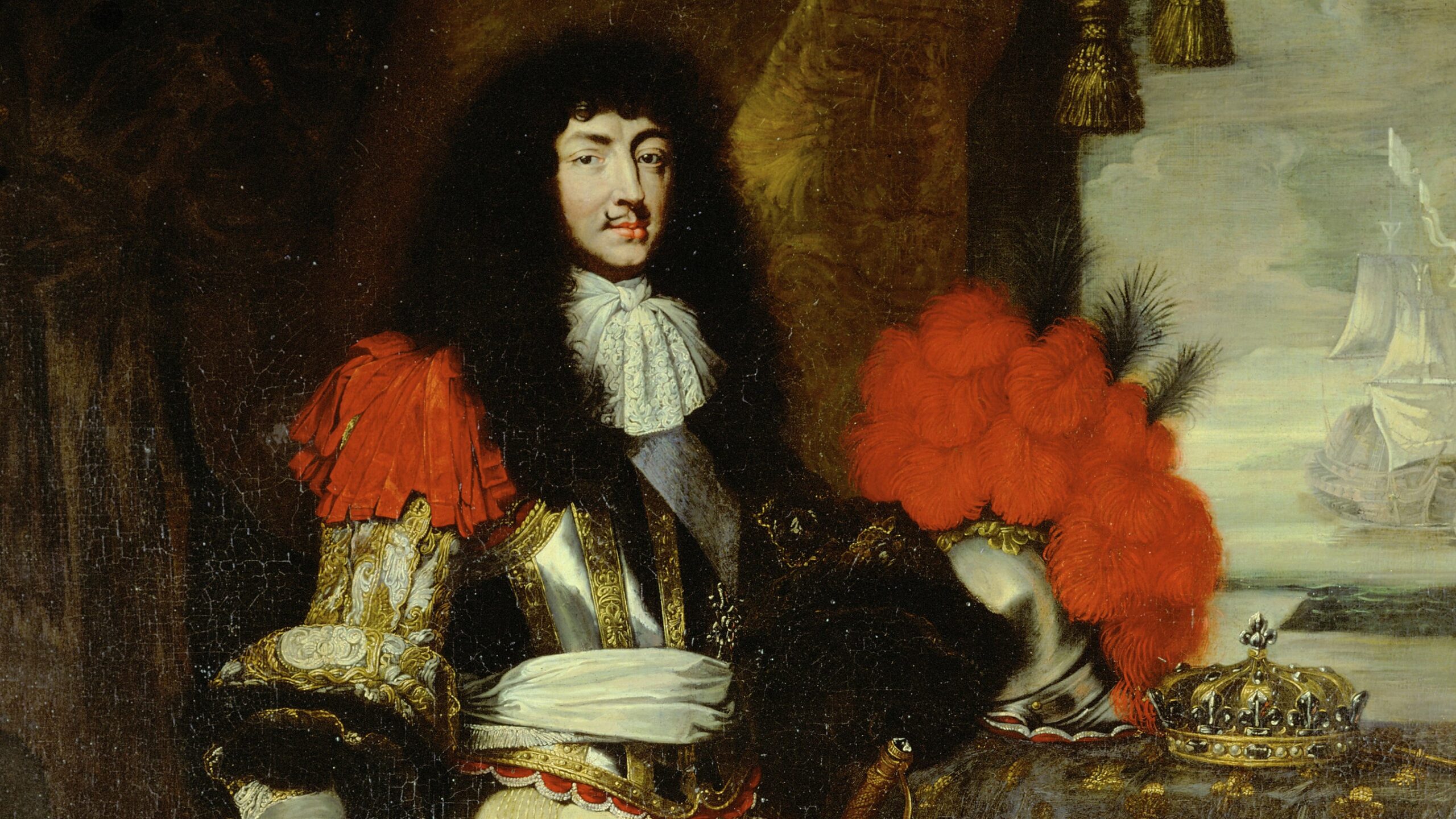BIOGRAPHY:
Louis XIV de Bourbon, the king of France and Navarre, was an adherent of absolute monarchy, he was called the “Sun King” and Louis the Great.
The reign of Louis XIV is called the Golden Age of France; his life is shrouded in legends and stories. There are versions that the expression “The State is me” belongs to him. The duration of his stay on the throne became the longest in European and world history. He ruled the country for 72 years and 101 days. He was also a supporter of divine origin. At birth he was named Louis-Dieudonné, which means “God-given.”
CHILDHOOD AND YOUTH:

The parents of the future “Sun King” came from the two most influential dynasties of France at that time – the Bourbons and the Habsburgs. His father was Louis XIII and his mother was Queen Anne of Austria. The ruling couple waited 23 years for the birth of an heir. And on September 5, 1638, their first-born was born, the boy was named Louis-Dieudonné – “God-given.” France rejoiced, the heir to the throne finally appeared.
Soon after the birth of the first son, a second child was born and was named Philip. The kids spent their childhood in a happy environment. They were surrounded by the love of their parents. But five years later, Louis’s father died. Even before his death, King Louis XIII wrote a will, which stated that under his young heir there would be a regency council, which was to include Prince Gaston d’Orléans, Prince Condé, Minister Mazarin, Claude Boutiller, Chavigny and Chancellor Seguier. And all decisions were to be made only by general consent. But five days after the death of her husband, Anna challenged this will at the assembled Parisian Parliament and became the regent herself under the little king.
Mother, Anna of Austria, decides to move to the Palais Royal, which was previously the Richelieu Palace. After the move, the situation changed radically and became more ascetic. Cardinal Mazarin, who was the queen’s favorite, practically began to manage the treasury himself. By nature, he was quite stingy and did not allocate funds for entertainment. When the child was seven years old, Mazarin himself appointed mentors for him. The cardinal’s stinginess knew no bounds; often holes were seen in the little king’s bed linen, and the clothes the child wore were a pitiful sight, they were mended and patched.
Mazarin explained his tight-fisted character by expenses associated with the war – the Fronde, and supposedly he needed to save on everything. As a child, Louis stood on the verge of death several times. The first case occurred when Louis was only five years old, he almost drowned in the pond of the Palais Royal, and at the age of 10 he contracted smallpox, the doctors no longer hoped for his recovery, but the boy recovered. At the age of fifteen, he developed a tumor in his chest, and at nineteen he was seriously poisoned, and then fell ill with typhoid fever. His condition was such that a priest had already confessed to him. And thanks to the queen’s doctor, he recovered, but the medicine with which he was treated had a side effect, Louis went bald, and was forced to wear a wig for the rest of his days.
In 1649, Anna and her children had to flee for their lives; they were forced to leave the Palais Royal and settled in a residence near Paris. Louis XIV forever remembered this fear and deprivation that they had to endure, and this formed in him confidence in the need for absolute power and also a love for exorbitant waste.
A few years later, all the unrest was suppressed; the escaped Cardinal Mazarin returned from Brussels, who again became the unofficial ruler of the country. This right was actually transferred to him by Anna of Austria; we can say that she voluntarily gave him all power.
In 1659, the war with Spain came to an end, the Treaty of the Pyrenees was signed, which brought peace to the countries. In 1660, at the age of 22, King Louis XIV married Princess Maria Theresa of Austria of Spain. And just two years later, Cardinal Mazarin died, and Louis XIV took all power into his own hands and ruled independently until the end of his days.
BEGINNING OF THE BOARD:

It should be noted that Mazarin saved not only on the entertainment of the future monarch, but also on his education. Louis did not receive sufficient education and knowledge necessary for a ruler, and in general did not show any hope. But at the Council of State, assembled after the death of the cardinal, he announced independent rule, and did not even bother to appoint a first minister.
Although Louis XIV did not have extensive knowledge, he had the talent to select decent and educated surroundings for himself. He brought to himself such people as the talented economist Colbert, who subsequently strengthened state unity and improved the well-being of the people, developed trade and increased the French fleet, the Marquis de Louvois, and became an army reformer. But besides this, Louis exalted himself and practically elevated his royal rights into a semi-religious dogma. Over time, everyone realized that Louis XIV would no longer let power out of his hands; he was even able to remove his mother from control, whom he was still a little afraid of.
Gradually, Louis began to fill in the gaps in his education; from the windy Dauphin, who loved revelry and partying, he turned into a sensible emperor. He was distinguished by his quick thinking, he could immediately get to the heart of the issue and solve it. Reading books helped him express his thoughts quickly and clearly. Louis devoted all his free time to solving state issues.
But still, his pride and very high self-esteem remained forever. He believed that the palaces were not magnificent enough for him, and the royal residences were modest. In 1662, he ordered the reconstruction of the hunting lodge, which was located 17 kilometers from Paris, in the town of Versailles. The result was a whole palace ensemble, which was immersed in luxury. Another 50 years and 12-14% of annual expenditures from the state treasury were spent on its improvement.
For the first two decades, King Louis XIV lived in the Louvre, and later a little in the Tuileries. And then, starting in 1682, Versailles became his royal residence. Having finally moved to the magnificent and largest ensemble in Europe, the “Sun King” began to visit Paris only on short visits.
The pomp of the apartments surrounding Louis pushed him to introduce new rules of etiquette, including even all sorts of little things, for example, at least five servants had to serve him a glass of wine. These cumbersome and sometimes inappropriate rules also stipulated that during meals only the king could sit at the table, and even noble persons were not allowed chairs. Immediately after lunch, he had meetings with ministers and officials, and if the monarch suddenly felt unwell, then everyone had to come to his bedroom.

Every evening the fun began in Versailles. A huge number of guests gathered, for whom dances were organized, they were treated to delicious dishes, and of course they played cards, and this became Louis’s favorite pastime.
Each salon in the palace had its own name, which was given to it in accordance with its furnishings. The ensemble had a huge Mirror Gallery, its length was 72 meters, and its width was about 10 meters. Colored marble was laid on the floor, it was decorated with mirrors that rose from the floor to the ceiling. Thousands of candles in golden candelabras were reflected in them.
Louis favored representatives of art, writers and poets. The nobles entertained themselves with productions of plays by Moliere, Jean Racine and Pierre Corneille, which were staged at Versailles. During Maslenitsa celebrations, masquerades were held, and in the summer the monarch with his court and servants moved to the village of Trianon, which adjoined the luxurious gardens of Versailles. According to the etiquette established by Louis himself, at exactly midnight he left his guests and, after feeding his dogs, went to the royal bedroom. A few more ceremonies and rituals and the monarch fell asleep after a tiring day.
INTERNAL POLITICS:

Many concerns about state affairs were transferred to him onto the shoulders of his entourage. We must pay tribute to his finance minister, Jean-Baptiste Colbert, who managed the seemingly impossible. In a short period of time, he was able to strengthen the welfare of the third estate, trade and industry developed. He also played an important role in the formation of the fleet.
Another nobleman, the Marquis de Louvois, began reforming the army, and also succeeded in his endeavors; the army under Louis XIV was the largest. The famous marshal and military engineer Marquis de Vauban founded the fortresses, which later became a UNESCO heritage site. And his secretary of state, Comte de Tonnerre, who was responsible for military policy, turned out to be a brilliant diplomat.
During the reign of Louis XIV, there were 7 councils. The king personally appointed all provincial heads. They were obliged to maintain the provinces entrusted to them in constant combat readiness in case of war, administer fair justice, and keep the people in obedience to King Louis XIV.
The management of cities was transferred to councils or corporations consisting of their burgomasters. Maintaining a combat-ready army and administrative apparatus, and the cost of maintaining the courtyard, required large expenses. And the entire burden of this system fell on the small nobles and peasantry. Taxes were constantly increasing, which inevitably led to discontent among citizens.
Under Louis XIV, a Commercial Code was adopted, which was called the Ordinance. The king wanted to prevent the population from leaving the country; for this purpose, an edict was issued, which stated that households were confiscated from the French who left their homeland, and all their property was taken away. And if they went to work for foreign shipbuilders, then upon returning to France they faced the death penalty.
During the reign of Louis, a public position could be purchased for money, and then passed on by inheritance. In the last years of his tenure in power, more than 2.5 thousand different positions were sold, the proceeds amounted to 77 million livres. Civil servants did not receive fixed pay from public funds; payment came from taxes. For example, a certain duty was collected from each barrel of wine sold, which belonged to the broker.
RELIGIOUS POLITICS:

Louis XIV made a lot of efforts to destroy the political dependence of the clergy on the Pope. He even tried to organize a patriarchate independent from Rome. But Bishop Bossuet was able to keep the king from breaking with Rome. Louis was an ardent Catholic, which led to the persecution of other movements within the church.
Their churches began to be taken away from the Huguenots, religious ceremonies were prohibited according to the rules of their churches, and priests were persecuted. These actions led to numerous relocations of Protestants. More than 200 thousand left France and moved to England, Holland and Germany. Protestant aristocrats were forced to change their faith in order not to lose their lives and their social positions.
FOREIGN POLICY:

Louis XIV fought a lot and quite successfully. In 1667-1668 his army conquered Flanders. And four years later he started a war with Holland. Spain and Denmark came to the aid of their neighbor, and a little later Germany joined. But they still lost this war, and Alsace, Lorraine and the Belgian lands went to France.
Beginning in 1688, the number of victories of Louis XIV became significantly smaller. A united coalition, the League of Augsburg, opposed France. In 1692 they defeated the French fleet. But on land, the king’s troops still won victories. Increased taxes led to a peasant revolt. Soon the king had to ask for peace and make concessions. He returns Savoy, Luxembourg and Catalonia, and Lorraine becomes independent.
But the most grueling war was the War of the Spanish Succession, which broke out in 1701. England, Austria and Holland are again uniting against France. And in 1707, a 40,000-strong army crossed the Alps and invaded France. All forces and means were thrown into resisting this force. Even gold items from Versailles were melted down, and famine began in the country. But the enemy’s forces were also running out, and in 1713 the Peace of Utrecht was signed with the British, and a year later in Rishtadt with the Austrians.
PERSONAL LIFE:

At the age of 20, the young king fell in love with the beautiful eighteen-year-old niece of Cardinal Mazarin. The girl’s name was Maria Mancini, she was well educated and had a gentle disposition. Louis begged his mother and the cardinal to allow him to marry her, but state necessity required him to marry the Spanish Infanta Maria Theresa of Austria.
His beloved was given in marriage to an Italian prince, and he himself had to marry a hated Spanish woman. Louis had no intention of being faithful to his wife. The list of his mistresses is very impressive. Immediately after the wedding, he had an affair with the wife of the Duke of Orleans’ brother, Henrietta. In order not to get into an awkward position and to divert suspicion from herself, Henrietta introduces the king to her lovely maid of honor, the blonde Louise de la Vallière. The girl had a slight limp, but was quite sweet and smart.

The loving monarch liked the 17-year-old beauty, and as a result of a six-year romance, they had four children. Only two survived to adulthood, a son and daughter. Having lost interest in Louise, Louis alienated her from himself, and at the same time gave her the title of duchess.
His next favorite was the Marquise de Montespan; the ardent brunette was the king’s mistress for 16 long years. The woman had a practical mind, and allowed Louis to have affairs. The marquise gave birth to the “sun king” eight children, of whom only four survived. During this time, her two rivals each gave birth to one child from him.
But still she failed to retain the monarch’s affection. He became interested in her children’s governess, the Marquise de Maintenon. The woman was the wife of the poet Scarron. The king was pleased to talk with the educated marquise. He could talk to her for hours on various topics, besides, she supported his piety, and somehow Louis noticed that communication with her had become a necessity for him. Subsequently, after the death of the queen, she became his secret wife. Everyone noticed the monk’s transformation; not a trace remained of his former frivolity.
DEATH:

The overthrown ruler lived for several years in the Temple Castle. While imprisoned, he continued to be king, but only for his own relatives. He was informed about the events in Paris, but now he could do nothing.
The trial of Louis XVI took place at the end of 1792. At the meetings, the king behaved confidently and did not lose his self-esteem. When the death sentence was read out, the former autocrat looked completely calm.
The execution took place on January 21 of the following year. Having ascended the scaffold, the representative of the Bourbon dynasty said:
“I forgive everyone who is responsible for my death.”
MEMORY:
In the French city of Nantes there is a monument in honor of Louis XVI
The American city of Louisville is named in memory of the king.
In cinema, the image of the autocrat is present in the films “Marie Antoinette”, “The New World”, “Mockery” and “The French Revolution”.
